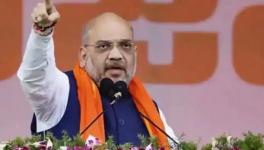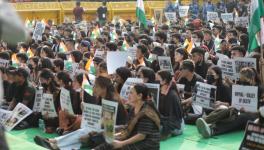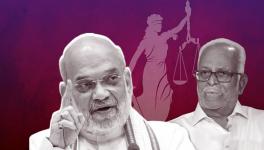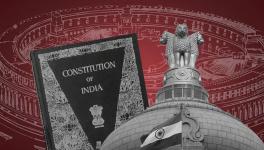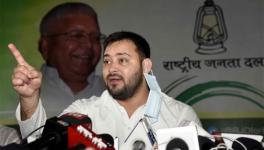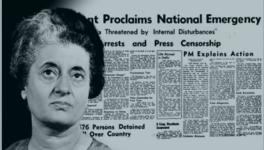Is Modi India’s Weakest Prime Minister?
Narendra Modi seems to be on schedule to finish two terms as Prime Minister. Given the timeline he has proposed for many of his government’s policies, he may even harbour a desire to work his way into a third term. Union Home Minister Amit Shah and Ram Madhav of the RSS also repeatedly inform us that the Bharatiya Janata Party is here for the “long haul”. There is a general insistence that Modi is the most decisive and resolute of all leaders, yet for all their claims it is quite probable that Modi will go down in history as the weakest prime minister.
It is almost a truism that once the din of high-pitched political campaigns and propaganda settle down, only common people still remember prime ministers of the past. Society’s elites do not burden themselves with memories of public figures, for they believe that whatever they have gained is only a reflection of what they deserve. It is the rural and urban poor who remain grateful for whatever advantage they are able to secure from the political leaders. The disadvantaged also seem to have a better understanding of how India’s system works: they know that all benefits that accrue to them are despite stringent opposition.
Consider India’s former prime ministers and their legacies in this context: first prime minister Jawaharlal Nehru is remembered for having laid the foundation of a secular-democratic nation-state. Yet, the popular recollection of Nehru is not so vivid today as it is of Indira Gandhi, his daughter and a former prime minister too. She is still remembered for her robust welfare policies. It often surprises me during field surveys when older citizens refer to Rahul Gandhi as “Indira’s grandson”. At times, people narrate their first-hand account of how welfare policies such as the Public Distribution System or housing-for-all schemes benefitted them. The middle class chiefly remembers Indira for her role in the creation of Bangladesh, for imposing Emergency in 1975, and for her mishandling of the crisis in Punjab, leading to her assassination.
There is, by contrast, not much for the poor to recollect about the Janata Party experiment, although it secured brief stints as prime minister for Deve Gowda and Chandrasekhar. Only former prime minister VP Singh, who shared the Janata Party legacy, is remembered for having implemented the long-pending recommendations of the Mandal Commission, which ultimately brought about a tectonic shift in Indian politics and society. Those changes are still being debated—including whether creating a new majority as a political constituency is linked to growing majoritarianism, given the recent rightward shift of a sizeable section among the backward classes. Notwithstanding this, extending affirmative action to the socially and educationally backward classes is seen as a significant redistributive measure, even if it did not result in a “secular upsurge”.
The next prime minister, Rajiv Gandhi, is barely a part of the popular consciousness. He initiated modernisation, especially new technology, but this neither concerned nor benefitted the poor, at least not immediately and directly. Rajiv’s inability to connect with the masses and his weak familiarity with the popular idiom are important factors. Similar is the story of Narasimha Rao, who launched economic reforms during his term as prime minister, but introduced no major social transformation nor proposed a redistributive policy.
It seems evident that leaders do not get etched in popular memory unless they attempt to revamp the relative status of ordinary Indians. Take Atal Bihari Vajpayee, who is barely a part of popular memory. People recall his bus yatra to Pakistan and a somewhat genuine attempt to bring peace to the region with his “Kashmiriyat, jhamooriyat, insaniyat” slogan. Beyond this, he was both politically and ethically inconsistent.
Vajpayee took no position on the violence in Gujarat in 2002, and if he did, he turned it around with the communal speech he delivered in Goa in April the same year. He did not go to Ayodhya when the Babri mosque was demolished in December 1992, but he gave ugly speeches from Lucknow a day earlier, while his second-in-command LK Advani addressed aggressive mobs at the site where the mosque once stood. Such strategies may help the party and its top leader to attain power and cling to it, but they do not help create a lasting legacy. Even those who do not recall these exact details about Vajpayee still remember him, at best, as “the right man in the wrong party”.
It hardly needs to be stressed that former prime minister Manmohan Singh will have very little place in popular history and memory. Ordinary people barely ever speak of him despite the fact he, next to only Nehru, completed two terms as prime minister. The reason is the same—Manmohan ushered in economic reform, but neither contributed to social change nor to redistributive measures. If anything, he actively blocked social policy measures in the name of growth.
In this context, it is pertinent to understand what Modi would be remembered for. He has attempted to change the very terms of discourse—taking India away from the emphasis on welfare and empowering vulnerable caste groups only to recast them as “unified Hindus”. Will this be a lasting legacy once the propaganda machine starts to slow? It is already for everyone to see that the euphoria of abrogating Article 370 and Art 35-A, and the noise over building a temple at Ayodhya do not have the same emotional appeal they had just a short time back. A section of people may feel momentarily enthused by these steps—abrasive decisions can help distract from other forms of discontent—but it looks unlikely that they will remain etched in the popular memory.
Instead, the farmers’ protests have revealed the Modi government’s compulsions, its compromises and consonance with the corporate. The Prime Minister’s early attempts to replace Nehru as a global statesman and Indira as a messiah are already non-starters. It is possible that Modi will be remembered as the weakest prime minister, for he looks weak and compromising against powerful corporate forces and even against adversaries, as he does when compared with China. When he was projected as a strongman, it was against the weak, especially the disadvantaged Muslims and Dalits.
It is an intriguing logic of history that even those social elites who gloat over his anti-poor economics and anti-weak politics would not want to carry the burden of such a legacy. The empty rhetoric that Modi generates will be washed away by the vagaries of history, though a core of the Hindutva Right might still want to admire and remember him for taking “bold” decisions on Kashmir and inaugurating the temple in Ayodhya. It should collectively interest us how history and memory register in popular memory and consciousness: the compassionate and pro-poor are remembered for long, not those who stand with the strong.
But why should collective memory work differently from the here-and-now exigencies of politics? Why day-to-day politics does not emphasise on revealing the more compassionate self, even though we yearn for compassion as a memory, tells us something about how humans approach reality, as against fantasy.
The author is associate professor, Centre for Political Studies, JNU. The views are personal.
Get the latest reports & analysis with people's perspective on Protests, movements & deep analytical videos, discussions of the current affairs in your Telegram app. Subscribe to NewsClick's Telegram channel & get Real-Time updates on stories, as they get published on our website.












